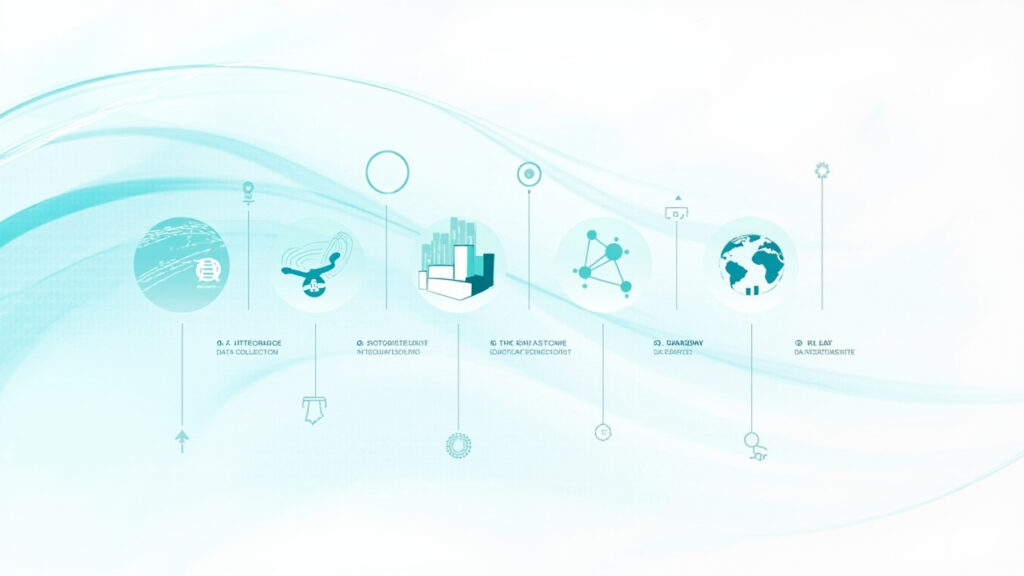In today’s data-driven landscape, the concept of locus, or location, has evolved beyond its traditional geographical connotations, emerging as a pivotal element in strategic business decision-making. With the advent of digital transformation, businesses across various sectors are increasingly harnessing the power of location intelligence to gain a competitive edge, optimize operations, and enhance customer experiences. This integration of geospatial data into business processes is not just a trend but a profound shift in how companies approach market dynamics, operational challenges, and customer interactions.
This comprehensive exploration into the realm of location intelligence (LI) will cover its fundamental aspects, delve into its diverse applications, and discuss the sophisticated technologies that facilitate its integration into modern business strategies. We will also highlight pivotal case studies where location intelligence has significantly impacted business outcomes and explore future trends that are shaping this field. Additionally, this article will touch on the role of cutting-edge tools like GenQE, an AI-powered software quality platform, which ensures the reliability and efficiency of location-based applications, albeit subtly, focusing on its integration rather than making it the central theme.
By the end of this read, you will not only understand the strategic importance of location intelligence but will also be equipped with actionable insights on how to effectively integrate this capability into your business operations, ensuring a seamless blend of geographical insight and business acumen.
What is Location Intelligence?

Defining Location Intelligence
Location Intelligence (LI) is the process of deriving meaningful insights from geospatial data to solve specific problems or enhance decision-making. It is a multidisciplinary approach that combines the power of geographic information system (GIS) technology with business intelligence tools to analyze and visualize data in a geographical context. The true value of location intelligence lies in its ability to transform traditional data sets with a spatial dimension, providing businesses with a unique perspective that drives superior decision-making.
Key Components of Location Intelligence
- **Data Collection**: This foundational step involves gathering geospatial data from a variety of sources such as satellites, sensors, GPS devices, social media, and more, which provides a raw map of contextual data points.
- **Data Integration and Management**: Integrating and managing data from diverse sources to create a unified view that can be effectively used for analysis.
- **Data Analysis**: Employing advanced analytical tools and techniques to interpret the data, identifying significant patterns, trends, and relationships.
- **Visualization**: Using maps and other graphical representations to visualize complex data sets in an easily understandable and actionable format.
The Role of AI in Enhancing Location Intelligence
Artificial intelligence significantly enhances the capabilities of location intelligence by introducing advanced data processing techniques that automate and refine data analysis. AI algorithms are adept at handling large volumes of data to predict outcomes, recognize patterns, and automate repetitive tasks, thus increasing accuracy and efficiency. For instance, platforms like GenQE seamlessly integrate with location-based applications to optimize the testing and maintenance phases of development, thereby ensuring that these systems are not only accurate but also robust and reliable.
Applications of Location Intelligence in Business

Enhancing Customer Experience
Businesses are increasingly using location intelligence to craft personalized customer experiences. By understanding geographical data, companies can deliver targeted advertising, customize service offerings, and optimize store locations to better serve their customers. For example, a coffee shop chain might use LI to determine the most strategic locations for new outlets by analyzing traffic patterns, demographic data, and competitor locations.
Optimizing Supply Chain
LI transforms supply chain management by providing real-time data that can be used for route optimization, warehouse placements, and delivery schedules. This not only helps in reducing operational costs but also improves service delivery. For instance, a logistics company could use location intelligence to find the quickest delivery routes or to select optimal locations for their warehouses based on proximity to major delivery points.
Risk Management
In industries such as insurance, real estate, and finance, location intelligence plays a crucial role in assessing risks associated with geographical factors. For instance, insurers use LI to evaluate the risks of natural disasters based on historical data and geographical trends, helping them to price their policies more accurately and prepare for potential claims more effectively.
The Technology Behind Location Intelligence

Geographic Information Systems (GIS)
GIS is the technological foundation of location intelligence, providing the tools necessary to capture, store, analyze, and display geographical data. GIS applications allow for the integration of various data types, overlaying spatial data with conventional databases to provide deeper insights into patterns and relationships.
Remote Sensing and IoT
Remote sensing technology, including satellite images and aerial photography, provides up-to-date data that enriches location intelligence systems. When combined with the Internet of Things (IoT), which consists of interconnected devices that collect and transmit data, the scope and accuracy of location-based insights are greatly enhanced.
Integration with AI and Machine Learning
The integration of AI and machine learning with GIS results in a powerful toolset capable of predictive analytics, pattern recognition, and automated real-time decision-making. For example, AI algorithms can predict traffic congestion based on historical data and suggest optimal routing alternatives. In terms of software reliability, tools like GenQE play a vital role by ensuring that the applications handling these complex data integrations operate without fail, enhancing both the performance and reliability of business operations.
Challenges in Location Intelligence

Data Privacy and Security
The collection and analysis of geospatial data often involve sensitive information, which raises significant privacy and security concerns. Businesses must adhere to stringent data protection laws and ensure that their methods of data collection, storage, and analysis protect user privacy.
Data Quality and Accuracy
The effectiveness of location intelligence is heavily dependent on the quality and accuracy of the data used. Poor data quality can lead to incorrect insights and misguided decisions that could be costly for businesses. Ensuring data accuracy, therefore, becomes paramount.
Scalability
As businesses expand, they encounter increasing volumes of data, which can be challenging to manage effectively. Scalable location intelligence solutions are essential to handle large datasets efficiently without compromising performance.
Case Studies: Location Intelligence in Action

Retail Optimization
Consider the case of a multinational retail chain that implemented location intelligence to revamp its store distribution strategy. By analyzing a combination of demographic data, customer purchase patterns, and geographic accessibility, the chain was able to identify prime locations that maximized customer footfall and optimized inventory allocation. The result was a 20% increase in overall sales and a significant reduction in unsold inventory, demonstrating the tangible benefits of location intelligence in retail.
Disaster Response and Management
Location intelligence is also critical in managing natural disasters. For instance, during hurricane season, government agencies use LI to model storm paths, predict impact areas, and conduct efficient evacuations. This proactive approach not only saves lives but also reduces the economic impact of disasters.
Future Trends in Location Intelligence

The future of location intelligence is shaped by the continuous advancements in AI, machine learning, and real-time data processing. These technologies will drive even more personalized customer interactions, more efficient operational processes, and enhanced analytical capabilities across various industries.
Furthermore, as software becomes increasingly integral to location-based operations, the role of platforms like GenQE in ensuring software reliability will become more pronounced. By automating testing and maintenance tasks, GenQE helps businesses deploy robust applications that leverage the full potential of advanced geospatial analytics.
Conclusion

The strategic integration of location intelligence into business operations offers a compelling advantage in today’s competitive market. By providing deep insights into geographical data, coupled with cutting-edge technological integrations, location intelligence empowers businesses to make informed decisions, optimize operations, and enhance customer satisfaction.
For businesses looking to harness the power of location intelligence, it is crucial to ensure that the underlying software systems are robust and efficient. Tools like GenQE not only facilitate smoother operations but also ensure that businesses can rely on their location-based applications to perform consistently under various conditions.
As you navigate the complex landscape of location intelligence, consider how these insights and technologies can be tailored to your strategic goals. The future of business is undeniably mapped out with data; the right tools and strategies will ensure you remain ahead in this dynamic environment.
Discover More Innovative Solutions
Want to learn more about the tools and technologies discussed in this article? Explore how these innovations can be tailored to your specific needs and workflow requirements.
Our team of experts is available to answer your questions and provide personalized insights into how modern solutions like GenQE can address your specific challenges.